Impact of Information Technology on Banking Services in the UK
VerifiedAdded on 2023/06/13
|10
|2219
|494
Report
AI Summary
This report investigates the transformative impact of information technology on banking services, focusing on the UK sector. It begins by defining information technology and its significance, then analyzes how IT has improved banking operations, including data gathering, customer satisfaction, and risk management. The report also examines the barriers faced by the banking sector, such as cyberattacks and disruptive technologies. A qualitative research approach, employing an Interpretivism philosophy and exploratory research design, is used. Data will be collected primarily from fresh sources through probability sampling, involving 50 banking professionals from the UK. Thematic data analysis will be used to interpret the data and develop effective results. The research is structured with a detailed timeline, covering topic selection, literature review, methodology design, data collection, sampling, and analysis. The report concludes with recommendations for improving IT within banking operations, aiming to enhance efficiency and customer satisfaction.
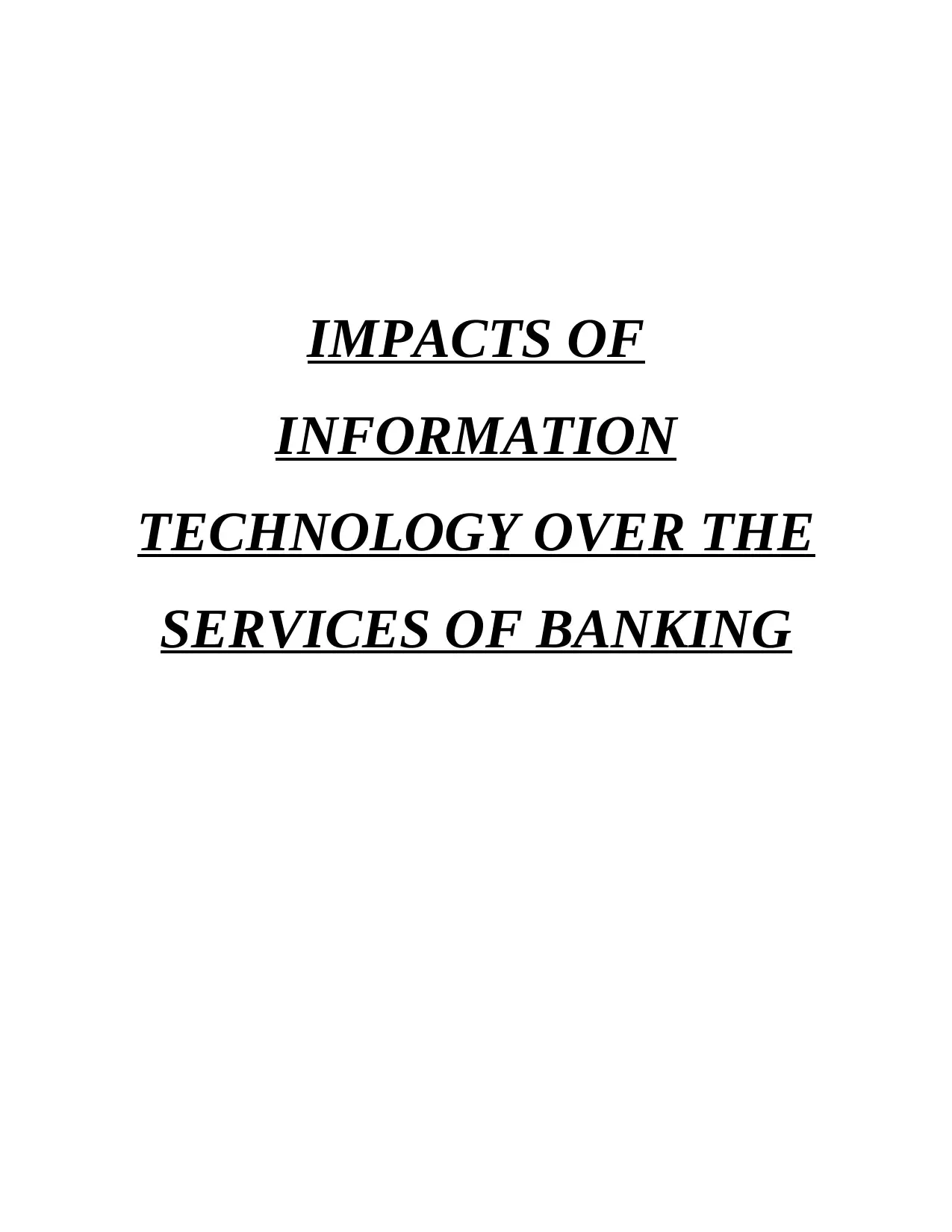
IMPACTS OF
INFORMATION
TECHNOLOGY OVER THE
SERVICES OF BANKING
INFORMATION
TECHNOLOGY OVER THE
SERVICES OF BANKING
Paraphrase This Document
Need a fresh take? Get an instant paraphrase of this document with our AI Paraphraser
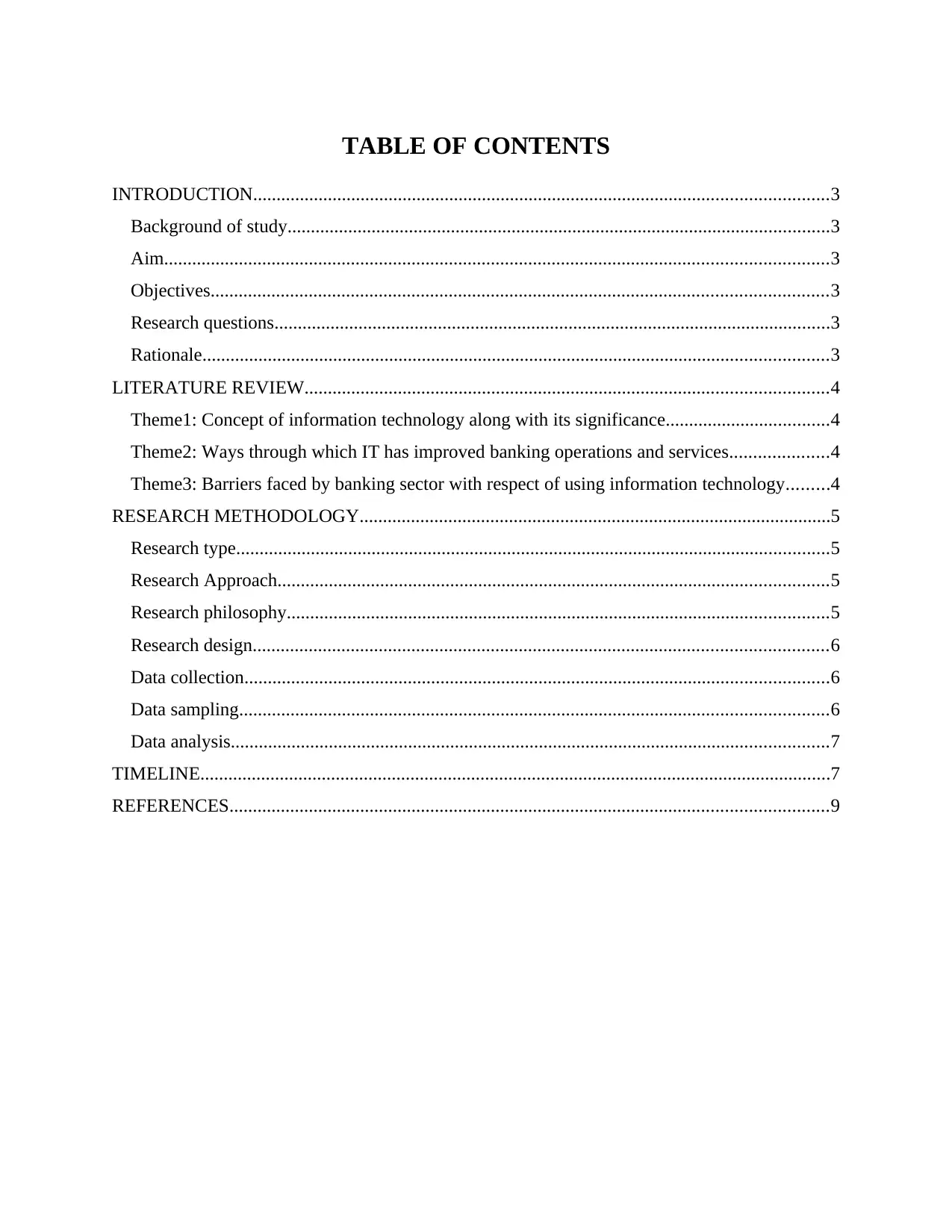
TABLE OF CONTENTS
INTRODUCTION...........................................................................................................................3
Background of study....................................................................................................................3
Aim..............................................................................................................................................3
Objectives....................................................................................................................................3
Research questions.......................................................................................................................3
Rationale......................................................................................................................................3
LITERATURE REVIEW................................................................................................................4
Theme1: Concept of information technology along with its significance...................................4
Theme2: Ways through which IT has improved banking operations and services.....................4
Theme3: Barriers faced by banking sector with respect of using information technology.........4
RESEARCH METHODOLOGY.....................................................................................................5
Research type...............................................................................................................................5
Research Approach......................................................................................................................5
Research philosophy....................................................................................................................5
Research design...........................................................................................................................6
Data collection.............................................................................................................................6
Data sampling..............................................................................................................................6
Data analysis................................................................................................................................7
TIMELINE.......................................................................................................................................7
REFERENCES................................................................................................................................9
INTRODUCTION...........................................................................................................................3
Background of study....................................................................................................................3
Aim..............................................................................................................................................3
Objectives....................................................................................................................................3
Research questions.......................................................................................................................3
Rationale......................................................................................................................................3
LITERATURE REVIEW................................................................................................................4
Theme1: Concept of information technology along with its significance...................................4
Theme2: Ways through which IT has improved banking operations and services.....................4
Theme3: Barriers faced by banking sector with respect of using information technology.........4
RESEARCH METHODOLOGY.....................................................................................................5
Research type...............................................................................................................................5
Research Approach......................................................................................................................5
Research philosophy....................................................................................................................5
Research design...........................................................................................................................6
Data collection.............................................................................................................................6
Data sampling..............................................................................................................................6
Data analysis................................................................................................................................7
TIMELINE.......................................................................................................................................7
REFERENCES................................................................................................................................9
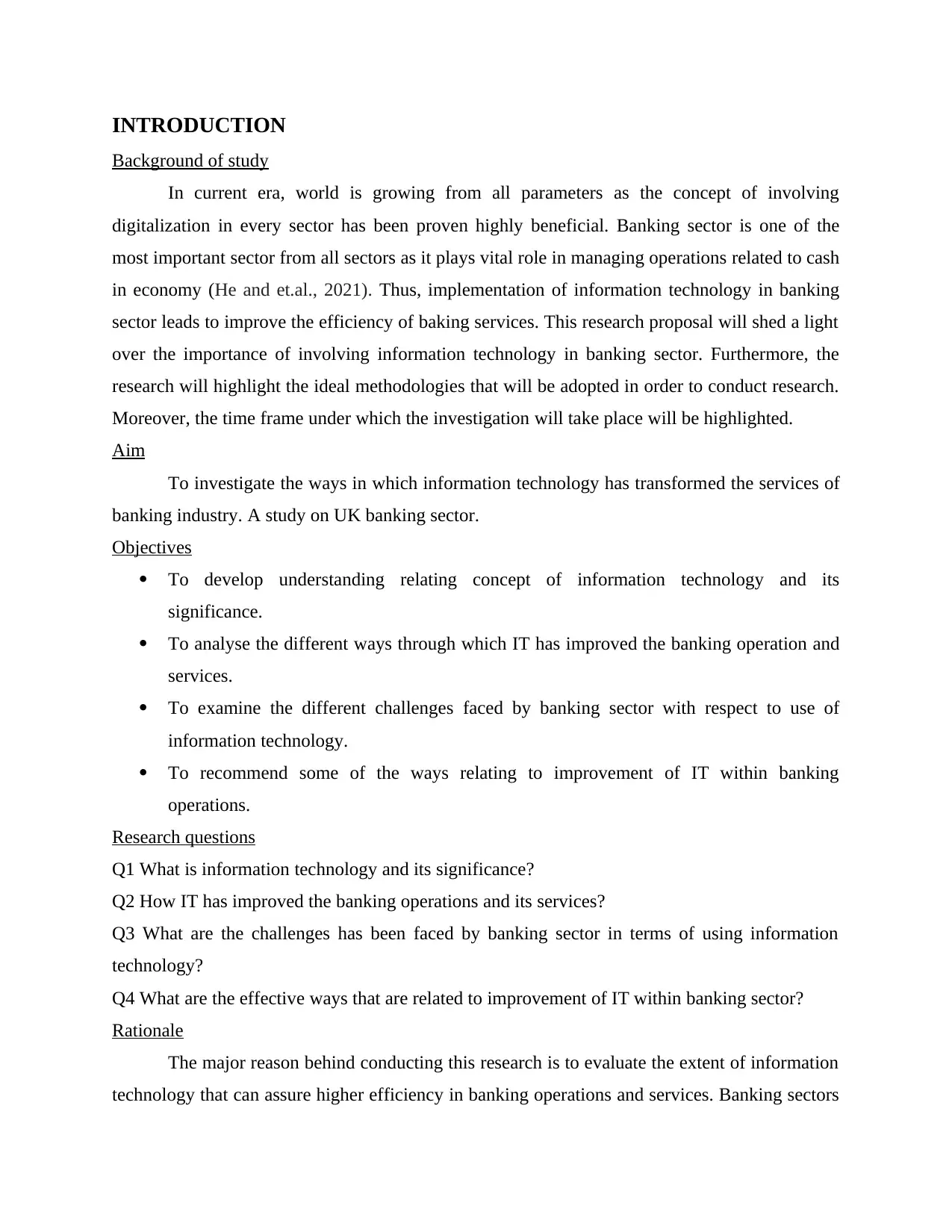
INTRODUCTION
Background of study
In current era, world is growing from all parameters as the concept of involving
digitalization in every sector has been proven highly beneficial. Banking sector is one of the
most important sector from all sectors as it plays vital role in managing operations related to cash
in economy (He and et.al., 2021). Thus, implementation of information technology in banking
sector leads to improve the efficiency of baking services. This research proposal will shed a light
over the importance of involving information technology in banking sector. Furthermore, the
research will highlight the ideal methodologies that will be adopted in order to conduct research.
Moreover, the time frame under which the investigation will take place will be highlighted.
Aim
To investigate the ways in which information technology has transformed the services of
banking industry. A study on UK banking sector.
Objectives
To develop understanding relating concept of information technology and its
significance.
To analyse the different ways through which IT has improved the banking operation and
services.
To examine the different challenges faced by banking sector with respect to use of
information technology.
To recommend some of the ways relating to improvement of IT within banking
operations.
Research questions
Q1 What is information technology and its significance?
Q2 How IT has improved the banking operations and its services?
Q3 What are the challenges has been faced by banking sector in terms of using information
technology?
Q4 What are the effective ways that are related to improvement of IT within banking sector?
Rationale
The major reason behind conducting this research is to evaluate the extent of information
technology that can assure higher efficiency in banking operations and services. Banking sectors
Background of study
In current era, world is growing from all parameters as the concept of involving
digitalization in every sector has been proven highly beneficial. Banking sector is one of the
most important sector from all sectors as it plays vital role in managing operations related to cash
in economy (He and et.al., 2021). Thus, implementation of information technology in banking
sector leads to improve the efficiency of baking services. This research proposal will shed a light
over the importance of involving information technology in banking sector. Furthermore, the
research will highlight the ideal methodologies that will be adopted in order to conduct research.
Moreover, the time frame under which the investigation will take place will be highlighted.
Aim
To investigate the ways in which information technology has transformed the services of
banking industry. A study on UK banking sector.
Objectives
To develop understanding relating concept of information technology and its
significance.
To analyse the different ways through which IT has improved the banking operation and
services.
To examine the different challenges faced by banking sector with respect to use of
information technology.
To recommend some of the ways relating to improvement of IT within banking
operations.
Research questions
Q1 What is information technology and its significance?
Q2 How IT has improved the banking operations and its services?
Q3 What are the challenges has been faced by banking sector in terms of using information
technology?
Q4 What are the effective ways that are related to improvement of IT within banking sector?
Rationale
The major reason behind conducting this research is to evaluate the extent of information
technology that can assure higher efficiency in banking operations and services. Banking sectors
⊘ This is a preview!⊘
Do you want full access?
Subscribe today to unlock all pages.

Trusted by 1+ million students worldwide
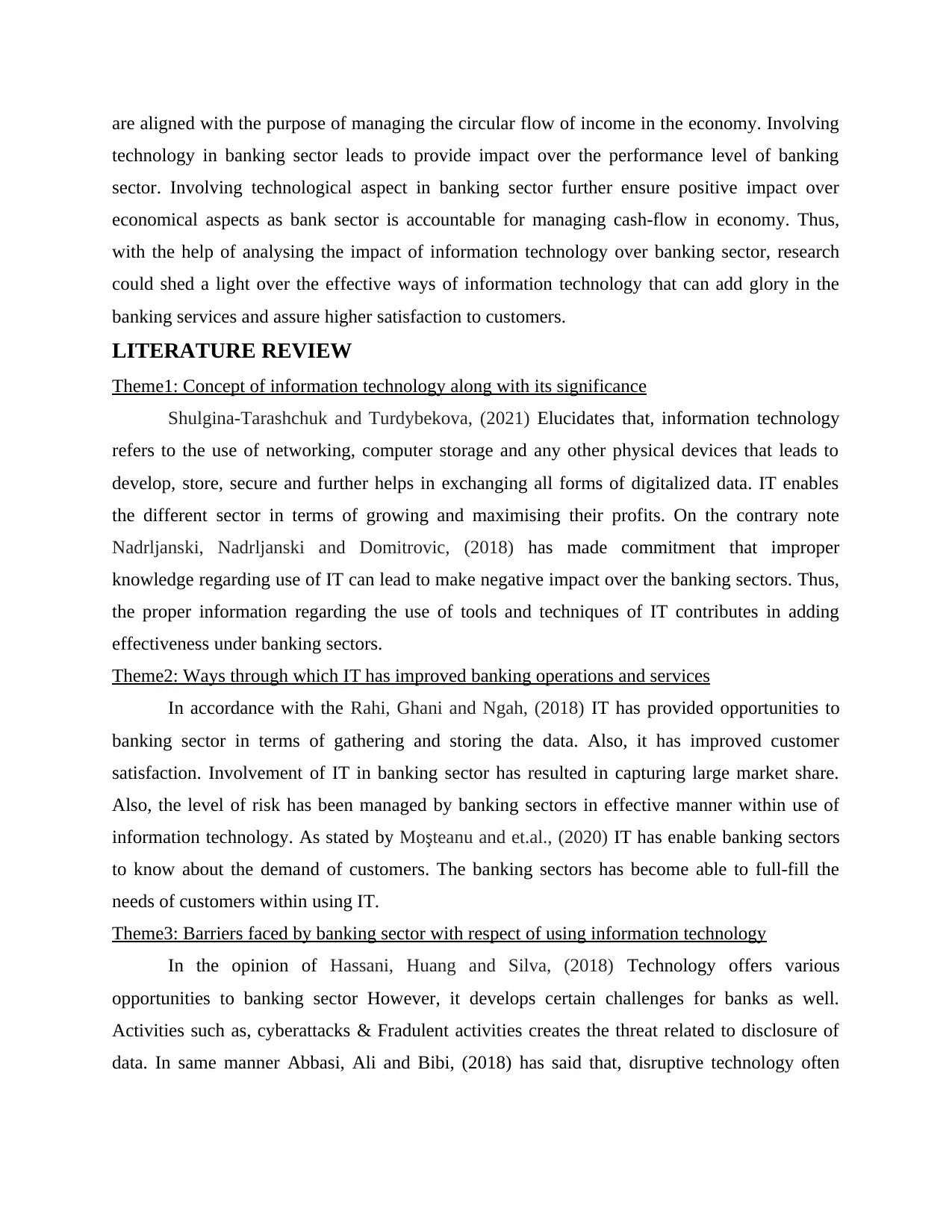
are aligned with the purpose of managing the circular flow of income in the economy. Involving
technology in banking sector leads to provide impact over the performance level of banking
sector. Involving technological aspect in banking sector further ensure positive impact over
economical aspects as bank sector is accountable for managing cash-flow in economy. Thus,
with the help of analysing the impact of information technology over banking sector, research
could shed a light over the effective ways of information technology that can add glory in the
banking services and assure higher satisfaction to customers.
LITERATURE REVIEW
Theme1: Concept of information technology along with its significance
Shulgina-Tarashchuk and Turdybekova, (2021) Elucidates that, information technology
refers to the use of networking, computer storage and any other physical devices that leads to
develop, store, secure and further helps in exchanging all forms of digitalized data. IT enables
the different sector in terms of growing and maximising their profits. On the contrary note
Nadrljanski, Nadrljanski and Domitrovic, (2018) has made commitment that improper
knowledge regarding use of IT can lead to make negative impact over the banking sectors. Thus,
the proper information regarding the use of tools and techniques of IT contributes in adding
effectiveness under banking sectors.
Theme2: Ways through which IT has improved banking operations and services
In accordance with the Rahi, Ghani and Ngah, (2018) IT has provided opportunities to
banking sector in terms of gathering and storing the data. Also, it has improved customer
satisfaction. Involvement of IT in banking sector has resulted in capturing large market share.
Also, the level of risk has been managed by banking sectors in effective manner within use of
information technology. As stated by Moşteanu and et.al., (2020) IT has enable banking sectors
to know about the demand of customers. The banking sectors has become able to full-fill the
needs of customers within using IT.
Theme3: Barriers faced by banking sector with respect of using information technology
In the opinion of Hassani, Huang and Silva, (2018) Technology offers various
opportunities to banking sector However, it develops certain challenges for banks as well.
Activities such as, cyberattacks & Fradulent activities creates the threat related to disclosure of
data. In same manner Abbasi, Ali and Bibi, (2018) has said that, disruptive technology often
technology in banking sector leads to provide impact over the performance level of banking
sector. Involving technological aspect in banking sector further ensure positive impact over
economical aspects as bank sector is accountable for managing cash-flow in economy. Thus,
with the help of analysing the impact of information technology over banking sector, research
could shed a light over the effective ways of information technology that can add glory in the
banking services and assure higher satisfaction to customers.
LITERATURE REVIEW
Theme1: Concept of information technology along with its significance
Shulgina-Tarashchuk and Turdybekova, (2021) Elucidates that, information technology
refers to the use of networking, computer storage and any other physical devices that leads to
develop, store, secure and further helps in exchanging all forms of digitalized data. IT enables
the different sector in terms of growing and maximising their profits. On the contrary note
Nadrljanski, Nadrljanski and Domitrovic, (2018) has made commitment that improper
knowledge regarding use of IT can lead to make negative impact over the banking sectors. Thus,
the proper information regarding the use of tools and techniques of IT contributes in adding
effectiveness under banking sectors.
Theme2: Ways through which IT has improved banking operations and services
In accordance with the Rahi, Ghani and Ngah, (2018) IT has provided opportunities to
banking sector in terms of gathering and storing the data. Also, it has improved customer
satisfaction. Involvement of IT in banking sector has resulted in capturing large market share.
Also, the level of risk has been managed by banking sectors in effective manner within use of
information technology. As stated by Moşteanu and et.al., (2020) IT has enable banking sectors
to know about the demand of customers. The banking sectors has become able to full-fill the
needs of customers within using IT.
Theme3: Barriers faced by banking sector with respect of using information technology
In the opinion of Hassani, Huang and Silva, (2018) Technology offers various
opportunities to banking sector However, it develops certain challenges for banks as well.
Activities such as, cyberattacks & Fradulent activities creates the threat related to disclosure of
data. In same manner Abbasi, Ali and Bibi, (2018) has said that, disruptive technology often
Paraphrase This Document
Need a fresh take? Get an instant paraphrase of this document with our AI Paraphraser
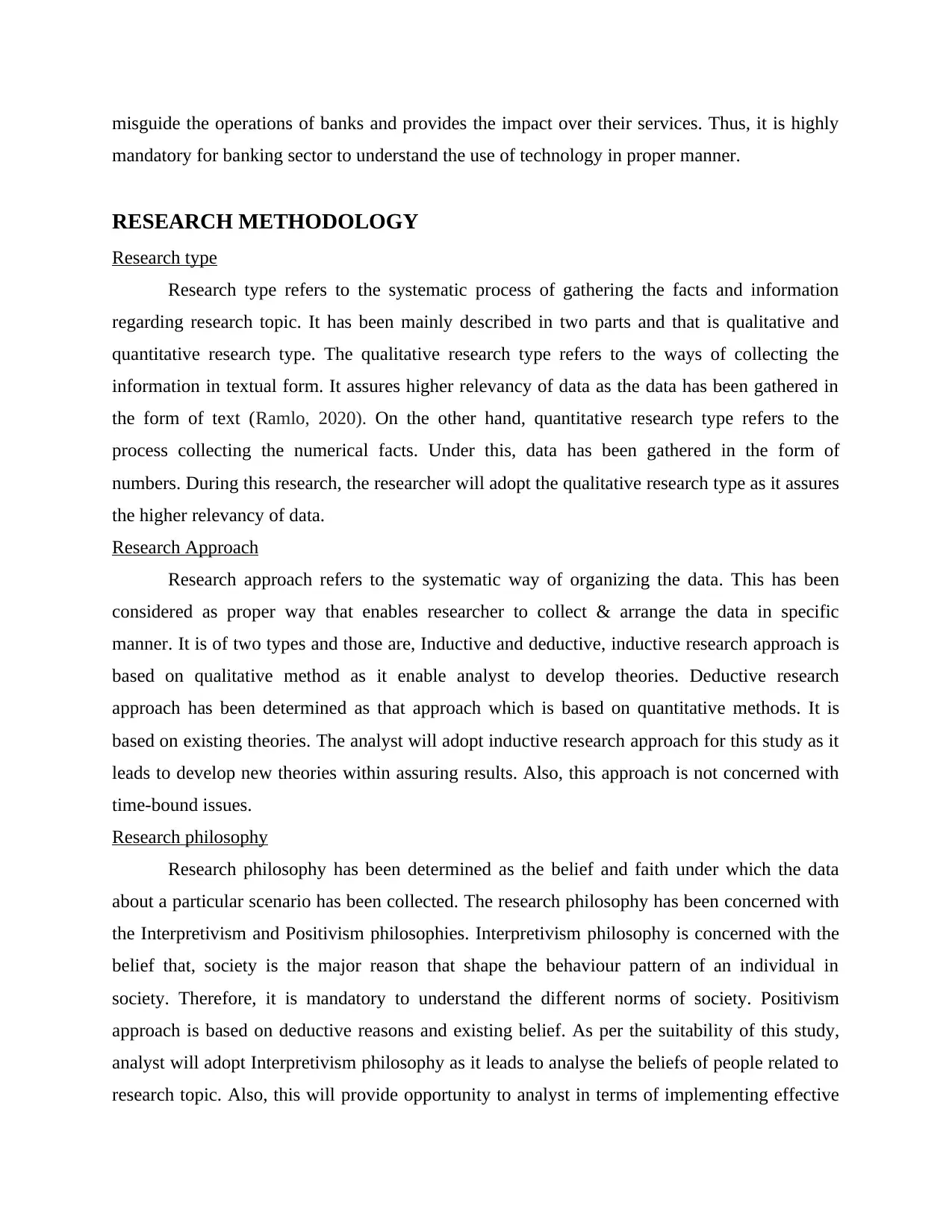
misguide the operations of banks and provides the impact over their services. Thus, it is highly
mandatory for banking sector to understand the use of technology in proper manner.
RESEARCH METHODOLOGY
Research type
Research type refers to the systematic process of gathering the facts and information
regarding research topic. It has been mainly described in two parts and that is qualitative and
quantitative research type. The qualitative research type refers to the ways of collecting the
information in textual form. It assures higher relevancy of data as the data has been gathered in
the form of text (Ramlo, 2020). On the other hand, quantitative research type refers to the
process collecting the numerical facts. Under this, data has been gathered in the form of
numbers. During this research, the researcher will adopt the qualitative research type as it assures
the higher relevancy of data.
Research Approach
Research approach refers to the systematic way of organizing the data. This has been
considered as proper way that enables researcher to collect & arrange the data in specific
manner. It is of two types and those are, Inductive and deductive, inductive research approach is
based on qualitative method as it enable analyst to develop theories. Deductive research
approach has been determined as that approach which is based on quantitative methods. It is
based on existing theories. The analyst will adopt inductive research approach for this study as it
leads to develop new theories within assuring results. Also, this approach is not concerned with
time-bound issues.
Research philosophy
Research philosophy has been determined as the belief and faith under which the data
about a particular scenario has been collected. The research philosophy has been concerned with
the Interpretivism and Positivism philosophies. Interpretivism philosophy is concerned with the
belief that, society is the major reason that shape the behaviour pattern of an individual in
society. Therefore, it is mandatory to understand the different norms of society. Positivism
approach is based on deductive reasons and existing belief. As per the suitability of this study,
analyst will adopt Interpretivism philosophy as it leads to analyse the beliefs of people related to
research topic. Also, this will provide opportunity to analyst in terms of implementing effective
mandatory for banking sector to understand the use of technology in proper manner.
RESEARCH METHODOLOGY
Research type
Research type refers to the systematic process of gathering the facts and information
regarding research topic. It has been mainly described in two parts and that is qualitative and
quantitative research type. The qualitative research type refers to the ways of collecting the
information in textual form. It assures higher relevancy of data as the data has been gathered in
the form of text (Ramlo, 2020). On the other hand, quantitative research type refers to the
process collecting the numerical facts. Under this, data has been gathered in the form of
numbers. During this research, the researcher will adopt the qualitative research type as it assures
the higher relevancy of data.
Research Approach
Research approach refers to the systematic way of organizing the data. This has been
considered as proper way that enables researcher to collect & arrange the data in specific
manner. It is of two types and those are, Inductive and deductive, inductive research approach is
based on qualitative method as it enable analyst to develop theories. Deductive research
approach has been determined as that approach which is based on quantitative methods. It is
based on existing theories. The analyst will adopt inductive research approach for this study as it
leads to develop new theories within assuring results. Also, this approach is not concerned with
time-bound issues.
Research philosophy
Research philosophy has been determined as the belief and faith under which the data
about a particular scenario has been collected. The research philosophy has been concerned with
the Interpretivism and Positivism philosophies. Interpretivism philosophy is concerned with the
belief that, society is the major reason that shape the behaviour pattern of an individual in
society. Therefore, it is mandatory to understand the different norms of society. Positivism
approach is based on deductive reasons and existing belief. As per the suitability of this study,
analyst will adopt Interpretivism philosophy as it leads to analyse the beliefs of people related to
research topic. Also, this will provide opportunity to analyst in terms of implementing effective
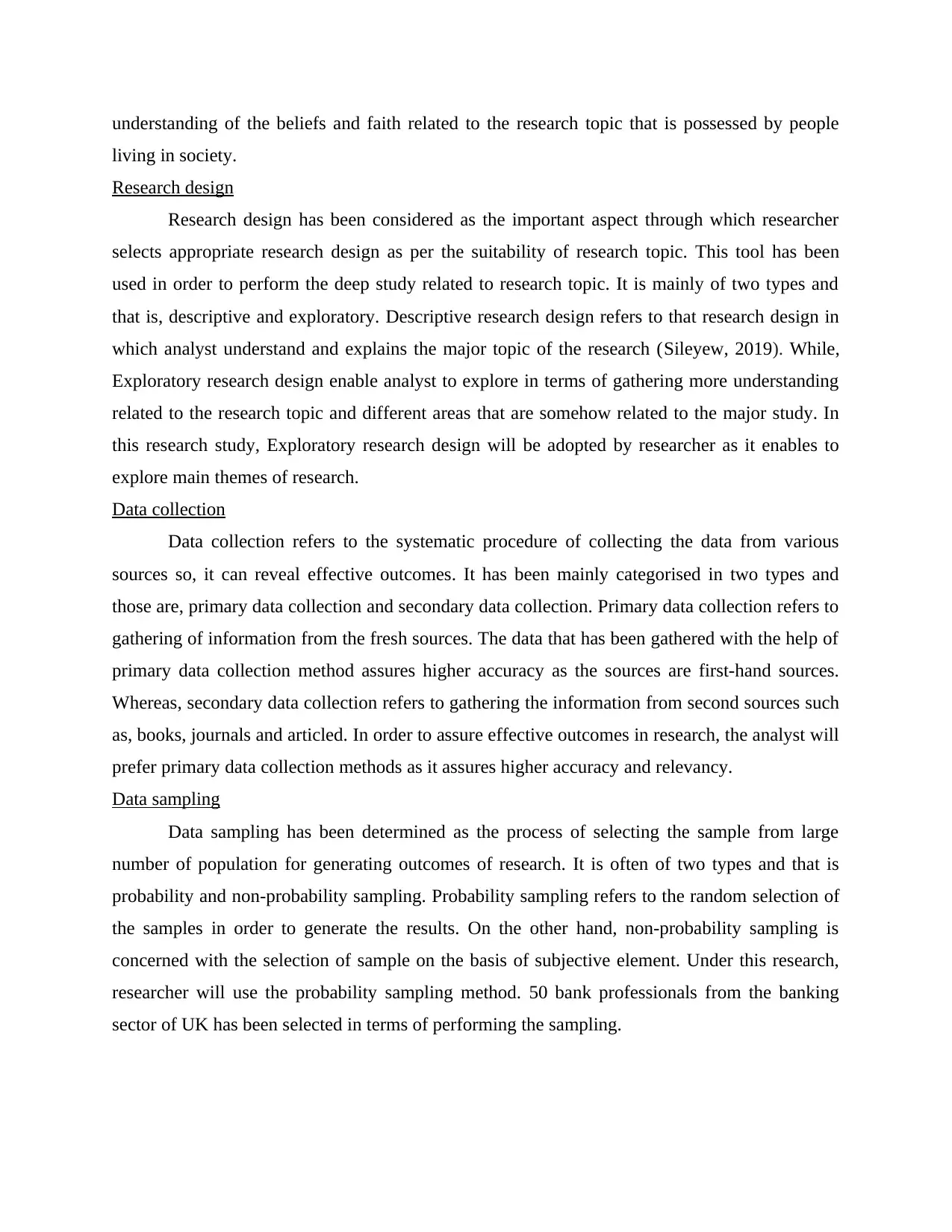
understanding of the beliefs and faith related to the research topic that is possessed by people
living in society.
Research design
Research design has been considered as the important aspect through which researcher
selects appropriate research design as per the suitability of research topic. This tool has been
used in order to perform the deep study related to research topic. It is mainly of two types and
that is, descriptive and exploratory. Descriptive research design refers to that research design in
which analyst understand and explains the major topic of the research (Sileyew, 2019). While,
Exploratory research design enable analyst to explore in terms of gathering more understanding
related to the research topic and different areas that are somehow related to the major study. In
this research study, Exploratory research design will be adopted by researcher as it enables to
explore main themes of research.
Data collection
Data collection refers to the systematic procedure of collecting the data from various
sources so, it can reveal effective outcomes. It has been mainly categorised in two types and
those are, primary data collection and secondary data collection. Primary data collection refers to
gathering of information from the fresh sources. The data that has been gathered with the help of
primary data collection method assures higher accuracy as the sources are first-hand sources.
Whereas, secondary data collection refers to gathering the information from second sources such
as, books, journals and articled. In order to assure effective outcomes in research, the analyst will
prefer primary data collection methods as it assures higher accuracy and relevancy.
Data sampling
Data sampling has been determined as the process of selecting the sample from large
number of population for generating outcomes of research. It is often of two types and that is
probability and non-probability sampling. Probability sampling refers to the random selection of
the samples in order to generate the results. On the other hand, non-probability sampling is
concerned with the selection of sample on the basis of subjective element. Under this research,
researcher will use the probability sampling method. 50 bank professionals from the banking
sector of UK has been selected in terms of performing the sampling.
living in society.
Research design
Research design has been considered as the important aspect through which researcher
selects appropriate research design as per the suitability of research topic. This tool has been
used in order to perform the deep study related to research topic. It is mainly of two types and
that is, descriptive and exploratory. Descriptive research design refers to that research design in
which analyst understand and explains the major topic of the research (Sileyew, 2019). While,
Exploratory research design enable analyst to explore in terms of gathering more understanding
related to the research topic and different areas that are somehow related to the major study. In
this research study, Exploratory research design will be adopted by researcher as it enables to
explore main themes of research.
Data collection
Data collection refers to the systematic procedure of collecting the data from various
sources so, it can reveal effective outcomes. It has been mainly categorised in two types and
those are, primary data collection and secondary data collection. Primary data collection refers to
gathering of information from the fresh sources. The data that has been gathered with the help of
primary data collection method assures higher accuracy as the sources are first-hand sources.
Whereas, secondary data collection refers to gathering the information from second sources such
as, books, journals and articled. In order to assure effective outcomes in research, the analyst will
prefer primary data collection methods as it assures higher accuracy and relevancy.
Data sampling
Data sampling has been determined as the process of selecting the sample from large
number of population for generating outcomes of research. It is often of two types and that is
probability and non-probability sampling. Probability sampling refers to the random selection of
the samples in order to generate the results. On the other hand, non-probability sampling is
concerned with the selection of sample on the basis of subjective element. Under this research,
researcher will use the probability sampling method. 50 bank professionals from the banking
sector of UK has been selected in terms of performing the sampling.
⊘ This is a preview!⊘
Do you want full access?
Subscribe today to unlock all pages.

Trusted by 1+ million students worldwide
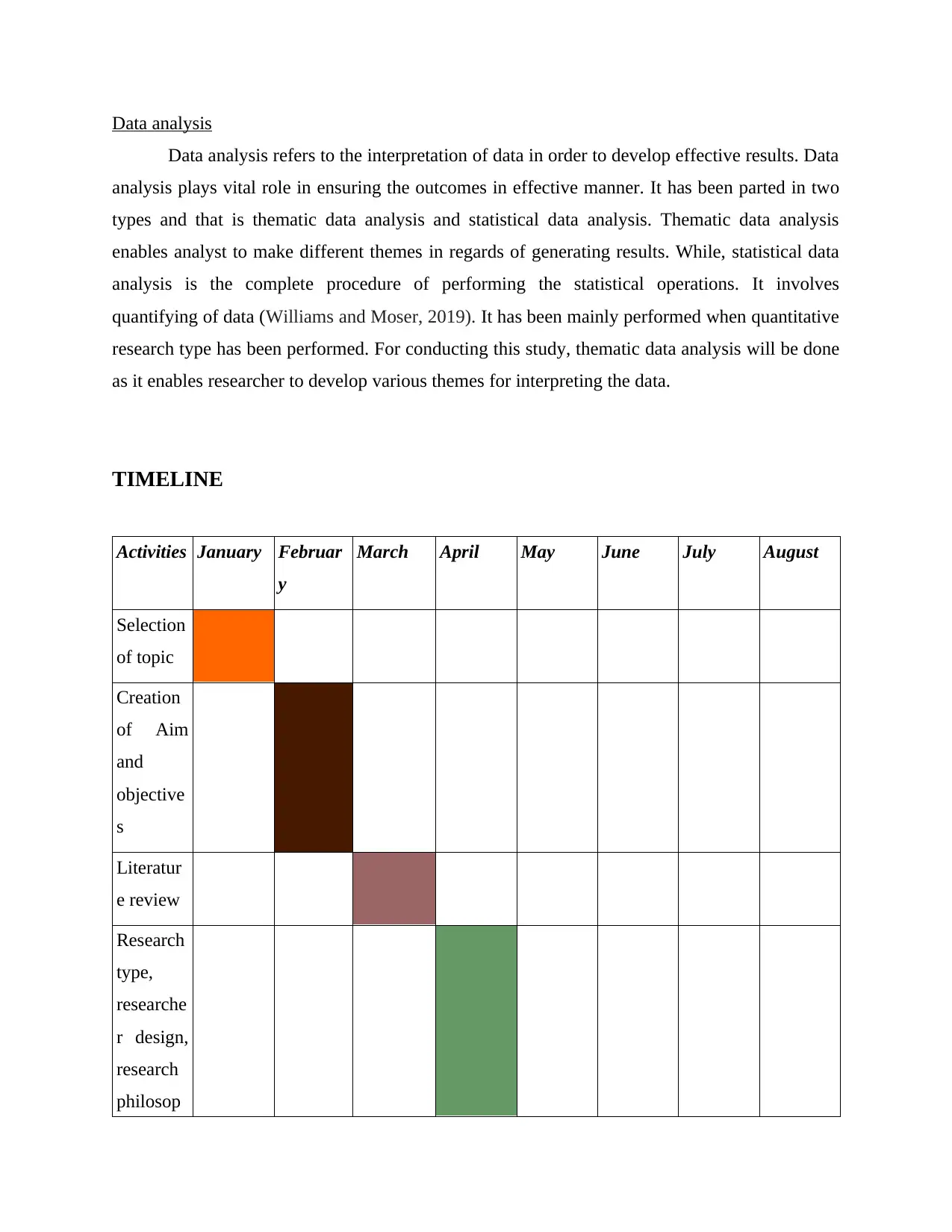
Data analysis
Data analysis refers to the interpretation of data in order to develop effective results. Data
analysis plays vital role in ensuring the outcomes in effective manner. It has been parted in two
types and that is thematic data analysis and statistical data analysis. Thematic data analysis
enables analyst to make different themes in regards of generating results. While, statistical data
analysis is the complete procedure of performing the statistical operations. It involves
quantifying of data (Williams and Moser, 2019). It has been mainly performed when quantitative
research type has been performed. For conducting this study, thematic data analysis will be done
as it enables researcher to develop various themes for interpreting the data.
TIMELINE
Activities January Februar
y
March April May June July August
Selection
of topic
Creation
of Aim
and
objective
s
Literatur
e review
Research
type,
researche
r design,
research
philosop
Data analysis refers to the interpretation of data in order to develop effective results. Data
analysis plays vital role in ensuring the outcomes in effective manner. It has been parted in two
types and that is thematic data analysis and statistical data analysis. Thematic data analysis
enables analyst to make different themes in regards of generating results. While, statistical data
analysis is the complete procedure of performing the statistical operations. It involves
quantifying of data (Williams and Moser, 2019). It has been mainly performed when quantitative
research type has been performed. For conducting this study, thematic data analysis will be done
as it enables researcher to develop various themes for interpreting the data.
TIMELINE
Activities January Februar
y
March April May June July August
Selection
of topic
Creation
of Aim
and
objective
s
Literatur
e review
Research
type,
researche
r design,
research
philosop
Paraphrase This Document
Need a fresh take? Get an instant paraphrase of this document with our AI Paraphraser
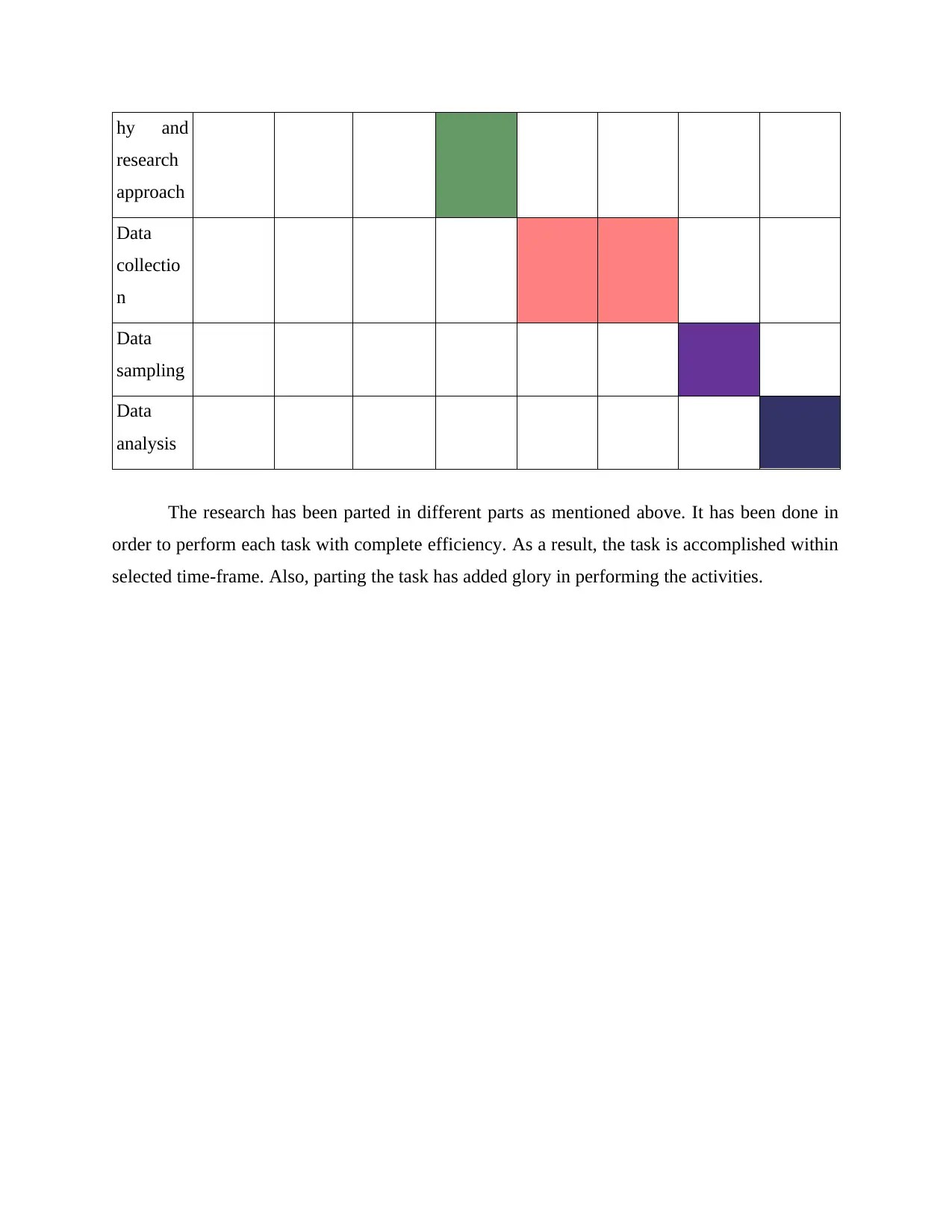
hy and
research
approach
Data
collectio
n
Data
sampling
Data
analysis
The research has been parted in different parts as mentioned above. It has been done in
order to perform each task with complete efficiency. As a result, the task is accomplished within
selected time-frame. Also, parting the task has added glory in performing the activities.
research
approach
Data
collectio
n
Data
sampling
Data
analysis
The research has been parted in different parts as mentioned above. It has been done in
order to perform each task with complete efficiency. As a result, the task is accomplished within
selected time-frame. Also, parting the task has added glory in performing the activities.
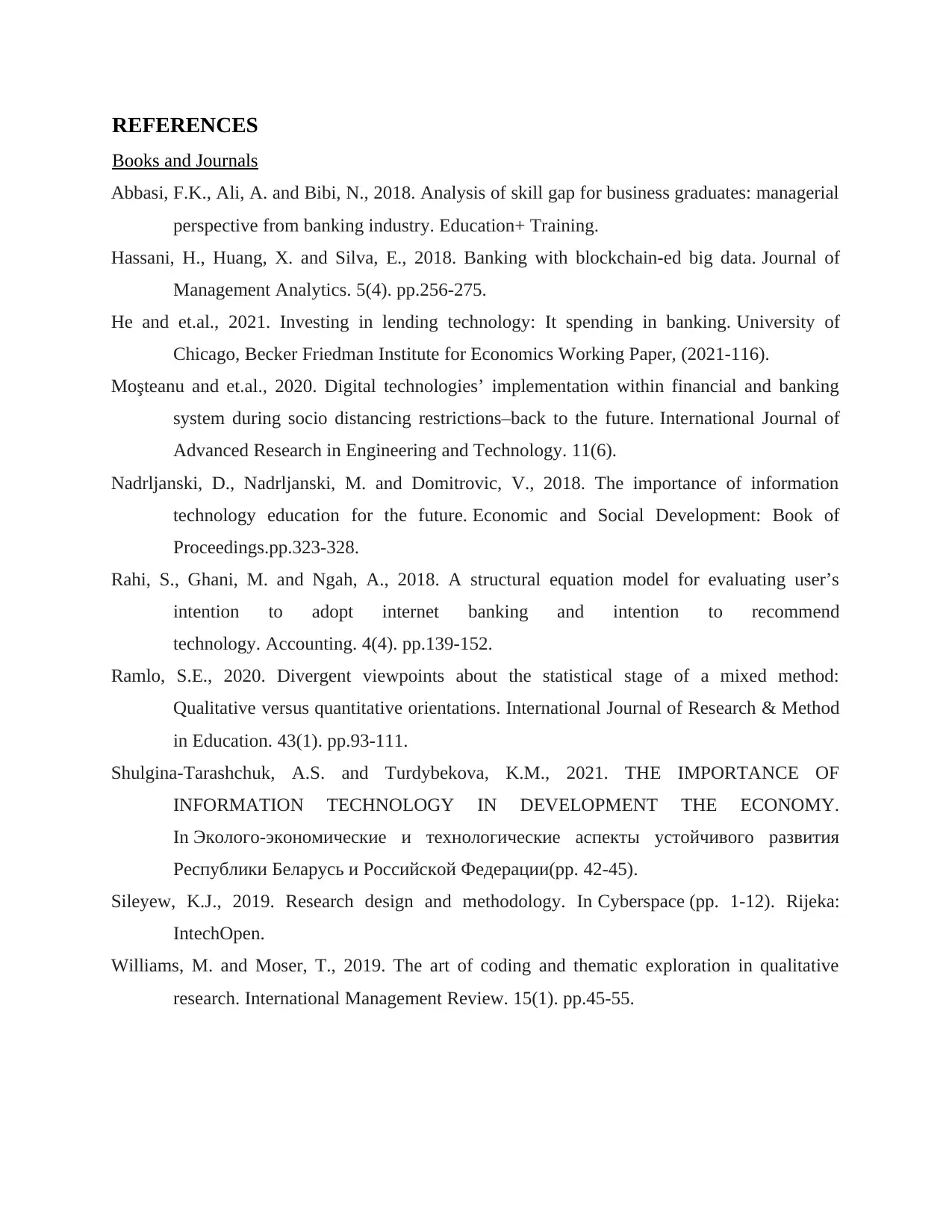
REFERENCES
Books and Journals
Abbasi, F.K., Ali, A. and Bibi, N., 2018. Analysis of skill gap for business graduates: managerial
perspective from banking industry. Education+ Training.
Hassani, H., Huang, X. and Silva, E., 2018. Banking with blockchain-ed big data. Journal of
Management Analytics. 5(4). pp.256-275.
He and et.al., 2021. Investing in lending technology: It spending in banking. University of
Chicago, Becker Friedman Institute for Economics Working Paper, (2021-116).
Moşteanu and et.al., 2020. Digital technologies’ implementation within financial and banking
system during socio distancing restrictions–back to the future. International Journal of
Advanced Research in Engineering and Technology. 11(6).
Nadrljanski, D., Nadrljanski, M. and Domitrovic, V., 2018. The importance of information
technology education for the future. Economic and Social Development: Book of
Proceedings.pp.323-328.
Rahi, S., Ghani, M. and Ngah, A., 2018. A structural equation model for evaluating user’s
intention to adopt internet banking and intention to recommend
technology. Accounting. 4(4). pp.139-152.
Ramlo, S.E., 2020. Divergent viewpoints about the statistical stage of a mixed method:
Qualitative versus quantitative orientations. International Journal of Research & Method
in Education. 43(1). pp.93-111.
Shulgina-Tarashchuk, A.S. and Turdybekova, K.M., 2021. THE IMPORTANCE OF
INFORMATION TECHNOLOGY IN DEVELOPMENT THE ECONOMY.
In Эколого-экономические и технологические аспекты устойчивого развития
Республики Беларусь и Российской Федерации(pp. 42-45).
Sileyew, K.J., 2019. Research design and methodology. In Cyberspace (pp. 1-12). Rijeka:
IntechOpen.
Williams, M. and Moser, T., 2019. The art of coding and thematic exploration in qualitative
research. International Management Review. 15(1). pp.45-55.
Books and Journals
Abbasi, F.K., Ali, A. and Bibi, N., 2018. Analysis of skill gap for business graduates: managerial
perspective from banking industry. Education+ Training.
Hassani, H., Huang, X. and Silva, E., 2018. Banking with blockchain-ed big data. Journal of
Management Analytics. 5(4). pp.256-275.
He and et.al., 2021. Investing in lending technology: It spending in banking. University of
Chicago, Becker Friedman Institute for Economics Working Paper, (2021-116).
Moşteanu and et.al., 2020. Digital technologies’ implementation within financial and banking
system during socio distancing restrictions–back to the future. International Journal of
Advanced Research in Engineering and Technology. 11(6).
Nadrljanski, D., Nadrljanski, M. and Domitrovic, V., 2018. The importance of information
technology education for the future. Economic and Social Development: Book of
Proceedings.pp.323-328.
Rahi, S., Ghani, M. and Ngah, A., 2018. A structural equation model for evaluating user’s
intention to adopt internet banking and intention to recommend
technology. Accounting. 4(4). pp.139-152.
Ramlo, S.E., 2020. Divergent viewpoints about the statistical stage of a mixed method:
Qualitative versus quantitative orientations. International Journal of Research & Method
in Education. 43(1). pp.93-111.
Shulgina-Tarashchuk, A.S. and Turdybekova, K.M., 2021. THE IMPORTANCE OF
INFORMATION TECHNOLOGY IN DEVELOPMENT THE ECONOMY.
In Эколого-экономические и технологические аспекты устойчивого развития
Республики Беларусь и Российской Федерации(pp. 42-45).
Sileyew, K.J., 2019. Research design and methodology. In Cyberspace (pp. 1-12). Rijeka:
IntechOpen.
Williams, M. and Moser, T., 2019. The art of coding and thematic exploration in qualitative
research. International Management Review. 15(1). pp.45-55.
⊘ This is a preview!⊘
Do you want full access?
Subscribe today to unlock all pages.

Trusted by 1+ million students worldwide

1 out of 10
Related Documents
Your All-in-One AI-Powered Toolkit for Academic Success.
+13062052269
info@desklib.com
Available 24*7 on WhatsApp / Email
![[object Object]](/_next/static/media/star-bottom.7253800d.svg)
Unlock your academic potential
Copyright © 2020–2025 A2Z Services. All Rights Reserved. Developed and managed by ZUCOL.




